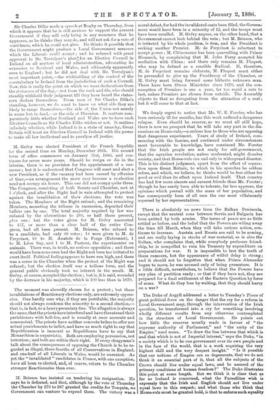Sir Charles Dilke made a speech at Rugby on Thursday,
from which it appears that he is still anxious to support the present Government if they will only bring in any measures that he approves, as he thinks they may,do, and will not ask-fors vote of confidence, which he could not give. He thinks it possible that the Government might produce a Local Government measure which the Liberals could accept ; and he referred with great approval to Mr. Trevelyan's plan for an Elective Council in Ireland on all matters of local administration, advocating its extension to Scotland and Wales, and ultimately apparently even to England ; but he did not deal with Mr. Trevelyan's most important point,—the withholding of the control of the constabulary in Ireland from the jurisdiction of such a Council. Now, this is really the point on which we want declarations from the statesmen of the day,—not from the rank and file, who should steadily withhold their judgment till they have heard the states- men declare themselves. From men of Sir Charles Dilke's standing, however, we do want to know on what side they are likely to range themselves,—the side of the Union not merely in name but in deed,—or the side of Disunion. It matters com- paratively little whether Scotland and Wales are to have such Elective Councils as Sir Charles Dilke wishes or not. It matters infinitely whether, while Ireland is in a state of anarchy, Great Britain will trust an Elective Council in Ireland with the power to make all law ineffectual and to paralyse all justice.










































 Previous page
Previous page